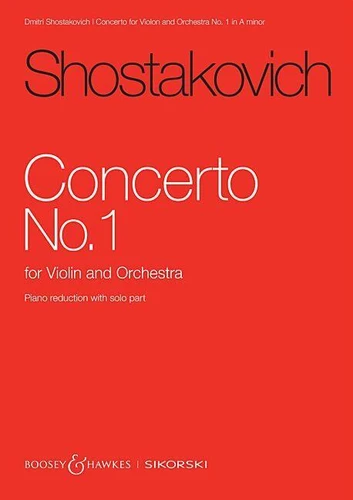Concerto for Violin and Orchestra No. 1. op. 77. violin and orchestra. Réduction pour piano avec partie soliste.
Par :Formats :
Actuellement indisponible
Cet article est actuellement indisponible, il ne peut pas être commandé sur notre site pour le moment. Nous vous invitons à vous inscrire à l'alerte disponibilité, vous recevrez un e-mail dès que cet ouvrage sera à nouveau disponible.
- Nombre de pages88
- Poids0.001 kg
- Dimensions21,0 cm × 29,7 cm × 0,0 cm
- ISBN978-3-68903-017-9
- EAN9783689030179
- Date de parution09/10/2025
- ÉditeurBOOSEY
Résumé
In 1948, Dmitri Shostakovich completed work on his first Violin Concerto. However, the cultural-political repression of late Stalinism initially prevented a premiere : it was not until 1955, two years after Stalin's death, that dedicatee David Oistrakh finally premiered the concerto with the Leningrad Philharmonic under Yevgeny Mravinsky. The four-part concerto is symphonic in style and characterized by a high level of expressiveness.
Particularly noteworthy are the sombre elegy of the first movement (Nocturne), the biting second movement (Scherzo), an extended passacaglia with cadenza and a brilliant burlesque finale. Oistrakh described the cadenza as "a whole sonata for solo violin". Today, the work is one of the most important violin concertos of the 20th century. Instrumentation : violin and orchestra op. 77
Particularly noteworthy are the sombre elegy of the first movement (Nocturne), the biting second movement (Scherzo), an extended passacaglia with cadenza and a brilliant burlesque finale. Oistrakh described the cadenza as "a whole sonata for solo violin". Today, the work is one of the most important violin concertos of the 20th century. Instrumentation : violin and orchestra op. 77
In 1948, Dmitri Shostakovich completed work on his first Violin Concerto. However, the cultural-political repression of late Stalinism initially prevented a premiere : it was not until 1955, two years after Stalin's death, that dedicatee David Oistrakh finally premiered the concerto with the Leningrad Philharmonic under Yevgeny Mravinsky. The four-part concerto is symphonic in style and characterized by a high level of expressiveness.
Particularly noteworthy are the sombre elegy of the first movement (Nocturne), the biting second movement (Scherzo), an extended passacaglia with cadenza and a brilliant burlesque finale. Oistrakh described the cadenza as "a whole sonata for solo violin". Today, the work is one of the most important violin concertos of the 20th century. Instrumentation : violin and orchestra op. 77
Particularly noteworthy are the sombre elegy of the first movement (Nocturne), the biting second movement (Scherzo), an extended passacaglia with cadenza and a brilliant burlesque finale. Oistrakh described the cadenza as "a whole sonata for solo violin". Today, the work is one of the most important violin concertos of the 20th century. Instrumentation : violin and orchestra op. 77

